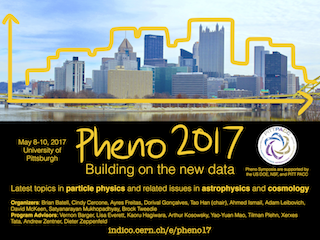Speaker
Description
Study of the CP parity of a Higgs boson and its anomalous couplings to gauge bosons or fermions is one of the priorities of the LHC and future Higgs factories. We present a coherent framework for the measurement of anomalous couplings of the Higgs boson to two weak vector bosons using the decay, vector boson fusion production, and associated production with a vector boson, where both on-shell and off-shell Higgs boson production is considered. We include interference with background processes where relevant. The framework also allows the study of anomalous couplings of the Higgs boson to fermions in ttH, bbH, tqH production and in H->tau tau decay. Particular emphasis is placed on the tools, which include the Monte Carlo generator, re-weighting techniques for fast simulation of anomalous interactions, and matrix element techniques for the optimal analysis of the processes. The formalism is presented using both the effective field theory and effective scattering amplitudes, where the dependence on the virtuality of the weak and Higgs bosons is also tested with form factors. The capabilities of the framework are illustrated with the projections for measuring CP-violating properties of the Higgs boson at the LHC and future Higgs factories.
